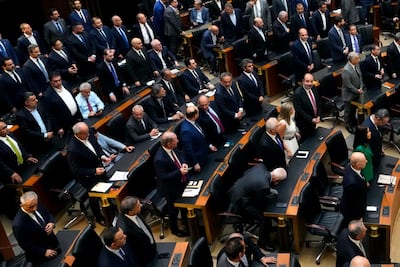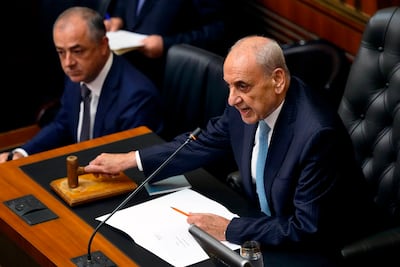Last November, Hezbollah’s secretary general, Hassan Nasrallah, described the president of Lebanon that his party wanted to see in office. Hezbollah sought “a president who would reassure the resistance”, and “who would not stab the resistance in the back”.
In issuing his conditions, Nasrallah forgot one key detail. In Lebanon’s sectarian system, the president is chosen from the Maronite Christian community, so for a Shiite political figure to set conditions on who should fill a major non-Shiite national post represented a risk. In early March, Nasrallah formally endorsed Suleiman Franjieh as Hezbollah’s candidate, showing the kind of candidate the party favoured.
When Mr Franjieh was broadly rejected by a panoply of major Christian parties, including Hezbollah’s ally the Free Patriotic Movement (FPM), the Shiite party did not budge. On the contrary, last month, when the FPM and its major rivals, the Lebanese Forces and the Kataeb Party, all agreed to back Jihad Azour as an alternative candidate to Mr Franjieh, Hezbollah’s reaction was anger.
The head of the party’s parliamentary bloc, Mohammad Raad, declared that Mr Azour was the candidate of “some in Lebanon who had the necessary impertinence to publicly declare their rejection of the candidate of the resistance axis [mumanaa]”, in favour of a candidate of “submission”.
What Mr Raad, and Hezbollah in general, refused to acknowledge was that the rare show of Christian unity was made possible because communal representatives did not want the leading Maronite post in the state to be selected by the Shiite duo – Hezbollah and the allied Amal Movement, led by Speaker Nabih Berri.
Hezbollah’s anger with the way the Christians managed to unite in opposition to Franjieh may have a more prosaic explanation
Yet without Christian cover, Mr Franjieh’s chances of being elected are low. None of the major non-Christian parties relish forcing a president on a community that doesn’t want him. Doing so could have severe repercussions for sectarian coexistence, isolate Mr Franjieh, crippling him politically, and lead to a counter-reaction against Shiite candidates backed by Hezbollah and Amal in the future.
On June 14, Lebanon’s parliament convened to elect a president, but neither Mr Franjieh nor Mr Azour won a two-thirds majority needed to win in a first round of voting. Both broad alignments also threatened to deny a quorum to prevent a second round of voting, when only an absolute majority is required for victory. This is what Hezbollah and Amal did to deny Mr Azour, who had won more votes than Mr Franjieh.
In other words, Lebanon is unlikely to have a president until the major parties in the country – which means Lebanon's major sectarian groups – can agree on a compromise candidate. In light of this, Hezbollah’s anger with the way the Christians managed to unite in opposition to Mr Franjieh may have a more prosaic explanation.
Realising that Mr Franjieh is not electable in light of his Christian isolation, Hezbollah may have fallen back on the only tactic available to it – responding with aggressiveness in order to strengthen its hand in negotiations over a third candidate. From the start, it seems, this may have been the party’s strategy, when it announced that its only candidate was Mr Franjieh. The aim was, simply, to extract a high price for giving up on him.
Hezbollah also had a second objective. It wants to show Mr Franjieh, an old ally who has been faithful in his relationship with the party, that it did all it could to bring him to office. Mr Franjieh is close to the Syrian regime, and Hezbollah does not want potential tensions with Damascus by moving too readily towards a fallback candidate.
However, that doesn’t change the fact that the party will have to take sectarian factors into consideration when opting for someone else. Any serious candidate will need to secure communal legitimacy by having the support of at least one of the major Christian parties. Since Hezbollah is especially hostile to the Lebanese Forces, it would probably prefer any Christian blessing for a candidate to come from the FPM.
The major question is what happens next in the presidential election saga. What is needed for a breakthrough is a complex package deal on the presidency, prime minister, and governor of the Central Bank, involving local, regional and international actors. For a third candidate to emerge, someone within Lebanon will have to play a mediating role, finding and marketing a candidate who can appeal to both sides of the local and regional divide. A respected analyst in Beirut, Khaldoun Al Sharif, believes Mr Berri will be one of those who fulfils this local role, probably in conjunction with the Druze leader Walid Joumblatt.
This assessment makes sense for two reasons. Mr Berri is trusted by Hezbollah and therefore can persuade the party. Moreover, as speaker, he has the institutional means to rally a majority in parliament for such a candidate. Mr Joumblatt, in turn, can speak to Mr Franjieh’s opponents, controls a bloc in parliament that can swing the election decisively towards a given candidate, and has been critical of the Lebanese Forces leader, which has earned him a measure of approval from Hezbollah.
It was noteworthy that after the botched election of June 14, Mr Berri declared that the only way out of the deadlock was “dialogue, then dialogue, then dialogue”. It’s difficult not to assume that the speaker was defining a role for himself as godfather of such a dialogue, and his old and close ties with Mr Joumblatt suggest he may not act alone.
The%20specs
%3Cp%3E%3Cstrong%3EPowertrain%3A%20%3C%2Fstrong%3ESingle%20electric%20motor%0D%3Cbr%3E%3Cstrong%3EPower%3A%20%3C%2Fstrong%3E201hp%0D%3Cbr%3E%3Cstrong%3ETorque%3A%20%3C%2Fstrong%3E310Nm%0D%3Cbr%3E%3Cstrong%3ETransmission%3A%20%3C%2Fstrong%3ESingle-speed%20auto%0D%3Cbr%3E%3Cstrong%3EBattery%3A%20%3C%2Fstrong%3E53kWh%20lithium-ion%20battery%20pack%20(GS%20base%20model)%3B%2070kWh%20battery%20pack%20(GF)%0D%3Cbr%3E%3Cstrong%3ETouring%20range%3A%20%3C%2Fstrong%3E350km%20(GS)%3B%20480km%20(GF)%0D%3Cbr%3E%3Cstrong%3EPrice%3A%20%3C%2Fstrong%3EFrom%20Dh129%2C900%20(GS)%3B%20Dh149%2C000%20(GF)%0D%3Cbr%3E%3Cstrong%3EOn%20sale%3A%3C%2Fstrong%3E%20Now%3C%2Fp%3E%0A
COMPANY PROFILE
Name: Rain Management
Year started: 2017
Based: Bahrain
Employees: 100-120
Amount raised: $2.5m from BitMex Ventures and Blockwater. Another $6m raised from MEVP, Coinbase, Vision Ventures, CMT, Jimco and DIFC Fintech Fund
Getting%20there%20and%20where%20to%20stay
%3Cp%3EEtihad%20Airways%20operates%20seasonal%20flights%20from%20Abu%20Dhabi%20to%20Nice%20C%C3%B4te%20d'Azur%20Airport.%20Services%20depart%20the%20UAE%20on%20Wednesdays%20and%20Sundays%20with%20outbound%20flights%20stopping%20briefly%20in%20Rome%2C%20return%20flights%20are%20non-stop.%20Fares%20start%20from%20Dh3%2C315%2C%20flights%20operate%20until%20September%2018%2C%202022.%C2%A0%3C%2Fp%3E%0A%3Cp%3EThe%20Radisson%20Blu%20Hotel%20Nice%20offers%20a%20western%20location%20right%20on%20Promenade%20des%20Anglais%20with%20rooms%20overlooking%20the%20Bay%20of%20Angels.%20Stays%20are%20priced%20from%20%E2%82%AC101%20(%24114)%2C%20including%20taxes.%3C%2Fp%3E%0A%3Cp%3E%3C%2Fp%3E%0A
Champion%20v%20Champion%20(PFL%20v%20Bellator)
%3Cp%3EHeavyweight%3A%20Renan%20Ferreira%20v%20Ryan%20Bader%20%3Cbr%3EMiddleweight%3A%20Impa%20Kasanganay%20v%20Johnny%20Eblen%3Cbr%3EFeatherweight%3A%20Jesus%20Pinedo%20v%20Patricio%20Pitbull%3Cbr%3ECatchweight%3A%20Ray%20Cooper%20III%20v%20Jason%20Jackson%3Cbr%3E%3C%2Fp%3E%0A%3Cp%3E%3Cstrong%3EShowcase%20Bouts%3C%2Fstrong%3E%3Cbr%3EHeavyweight%3A%20Bruno%20Cappelozza%20(former%20PFL%20World%20champ)%20v%20Vadim%20Nemkov%20(former%20Bellator%20champ)%3Cbr%3ELight%20Heavyweight%3A%20Thiago%20Santos%20(PFL%20title%20contender)%20v%20Yoel%20Romero%20(Bellator%20title%20contender)%3Cbr%3ELightweight%3A%20Clay%20Collard%20(PFL%20title%20contender)%20v%20AJ%20McKee%20(former%20Bellator%20champ)%3Cbr%3EFeatherweight%3A%20Gabriel%20Braga%20(PFL%20title%20contender)%20v%20Aaron%20Pico%20(Bellator%20title%20contender)%3Cbr%3ELightweight%3A%20Biaggio%20Ali%20Walsh%20(pro%20debut)%20v%20Emmanuel%20Palacios%20(pro%20debut)%3Cbr%3EWomen%E2%80%99s%20Lightweight%3A%20Claressa%20Shields%20v%20Kelsey%20DeSantis%3Cbr%3EFeatherweight%3A%20Abdullah%20Al%20Qahtani%20v%20Edukondal%20Rao%3Cbr%3EAmateur%20Flyweight%3A%20Malik%20Basahel%20v%20Vinicius%20Pereira%3C%2Fp%3E%0A
Company%C2%A0profile
%3Cp%3E%3Cstrong%3ECompany%20name%3A%20%3C%2Fstrong%3EHayvn%3Cbr%3E%3Cstrong%3EStarted%3A%20%3C%2Fstrong%3E2018%3Cbr%3E%3Cstrong%3EFounders%3A%20%3C%2Fstrong%3EChristopher%20Flinos%2C%20Ahmed%20Ismail%3Cbr%3E%3Cstrong%3EBased%3A%20%3C%2Fstrong%3EAbu%20Dhabi%2C%20UAE%3Cbr%3E%3Cstrong%3ESector%3A%20%3C%2Fstrong%3Efinancial%3Cbr%3E%3Cstrong%3EInitial%20investment%3A%20%3C%2Fstrong%3Eundisclosed%3Cbr%3E%3Cstrong%3ESize%3A%3C%2Fstrong%3E%2044%20employees%3Cbr%3E%3Cstrong%3EInvestment%20stage%3A%20%3C%2Fstrong%3Eseries%20B%20in%20the%20second%20half%20of%202023%3Cbr%3E%3Cstrong%3EInvestors%3A%20%3C%2Fstrong%3EHilbert%20Capital%2C%20Red%20Acre%20Ventures%3C%2Fp%3E%0A
Muslim Council of Elders condemns terrorism on religious sites
The Muslim Council of Elders has strongly condemned the criminal attacks on religious sites in Britain.
It firmly rejected “acts of terrorism, which constitute a flagrant violation of the sanctity of houses of worship”.
“Attacking places of worship is a form of terrorism and extremism that threatens peace and stability within societies,” it said.
The council also warned against the rise of hate speech, racism, extremism and Islamophobia. It urged the international community to join efforts to promote tolerance and peaceful coexistence.
UAE%20athletes%20heading%20to%20Paris%202024
%3Cp%3E%3Cstrong%3EEquestrian%3C%2Fstrong%3E%3Cbr%3EAbdullah%20Humaid%20Al%20Muhairi%2C%20Abdullah%20Al%20Marri%2C%20Omar%20Al%20Marzooqi%2C%20Salem%20Al%20Suwaidi%2C%20and%20Ali%20Al%20Karbi%20(four%20to%20be%20selected).%3Cbr%3E%3Cstrong%3EJudo%3C%2Fstrong%3E%3Cbr%3EMen%3A%20Narmandakh%20Bayanmunkh%20(66kg)%2C%20Nugzari%20Tatalashvili%20(81kg)%2C%20Aram%20Grigorian%20(90kg)%2C%20Dzhafar%20Kostoev%20(100kg)%2C%20Magomedomar%20Magomedomarov%20(%2B100kg)%3B%20women's%20Khorloodoi%20Bishrelt%20(52kg).%3Cbr%3E%3Cbr%3E%3Cstrong%3ECycling%3C%2Fstrong%3E%3Cbr%3ESafia%20Al%20Sayegh%20(women's%20road%20race).%3Cbr%3E%3Cbr%3E%3Cstrong%3ESwimming%3C%2Fstrong%3E%3Cbr%3EMen%3A%20Yousef%20Rashid%20Al%20Matroushi%20(100m%20freestyle)%3B%20women%3A%20Maha%20Abdullah%20Al%20Shehi%20(200m%20freestyle).%3Cbr%3E%3Cbr%3E%3Cstrong%3EAthletics%3C%2Fstrong%3E%3Cbr%3EMaryam%20Mohammed%20Al%20Farsi%20(women's%20100%20metres).%3C%2Fp%3E%0A
Abu Dhabi traffic facts
Drivers in Abu Dhabi spend 10 per cent longer in congested conditions than they would on a free-flowing road
The highest volume of traffic on the roads is found between 7am and 8am on a Sunday.
Travelling before 7am on a Sunday could save up to four hours per year on a 30-minute commute.
The day was the least congestion in Abu Dhabi in 2019 was Tuesday, August 13.
The highest levels of traffic were found on Sunday, November 10.
Drivers in Abu Dhabi lost 41 hours spent in traffic jams in rush hour during 2019
UAE currency: the story behind the money in your pockets
The stats
Ship name: MSC Bellissima
Ship class: Meraviglia Class
Delivery date: February 27, 2019
Gross tonnage: 171,598 GT
Passenger capacity: 5,686
Crew members: 1,536
Number of cabins: 2,217
Length: 315.3 metres
Maximum speed: 22.7 knots (42kph)
BMW M5 specs
Engine: 4.4-litre twin-turbo V-8 petrol enging with additional electric motor
Power: 727hp
Torque: 1,000Nm
Transmission: 8-speed auto
Fuel consumption: 10.6L/100km
On sale: Now
Price: From Dh650,000
Results
5pm: Wadi Nagab – Maiden (PA) Dh80,000 (Turf) 1,200m; Winner: Al Falaq, Antonio Fresu (jockey), Ahmed Al Shemaili (trainer)
5.30pm: Wadi Sidr – Handicap (PA) Dh80,000 (T) 1,200m; Winner: AF Majalis, Tadhg O’Shea, Ernst Oertel
6pm: Wathba Stallions Cup – Handicap (PA) Dh70,000 (T) 2,200m; Winner: AF Fakhama, Fernando Jara, Mohamed Daggash
6.30pm: Wadi Shees – Handicap (PA) Dh80,000 (T) 2,200m; Winner: Mutaqadim, Antonio Fresu, Ibrahim Al Hadhrami
7pm: Arabian Triple Crown Round-1 – Listed (PA) Dh230,000 (T) 1,600m; Winner: Bahar Muscat, Antonio Fresu, Ibrahim Al Hadhrami
7.30pm: Wadi Tayyibah – Maiden (TB) Dh80,000 (T) 1,600m; Winner: Poster Paint, Patrick Cosgrave, Bhupat Seemar
GOLF’S RAHMBO
- 5 wins in 22 months as pro
- Three wins in past 10 starts
- 45 pro starts worldwide: 5 wins, 17 top 5s
- Ranked 551th in world on debut, now No 4 (was No 2 earlier this year)
- 5th player in last 30 years to win 3 European Tour and 2 PGA Tour titles before age 24 (Woods, Garcia, McIlroy, Spieth)
What can victims do?
Always use only regulated platforms
Stop all transactions and communication on suspicion
Save all evidence (screenshots, chat logs, transaction IDs)
Report to local authorities
Warn others to prevent further harm
Courtesy: Crystal Intelligence




